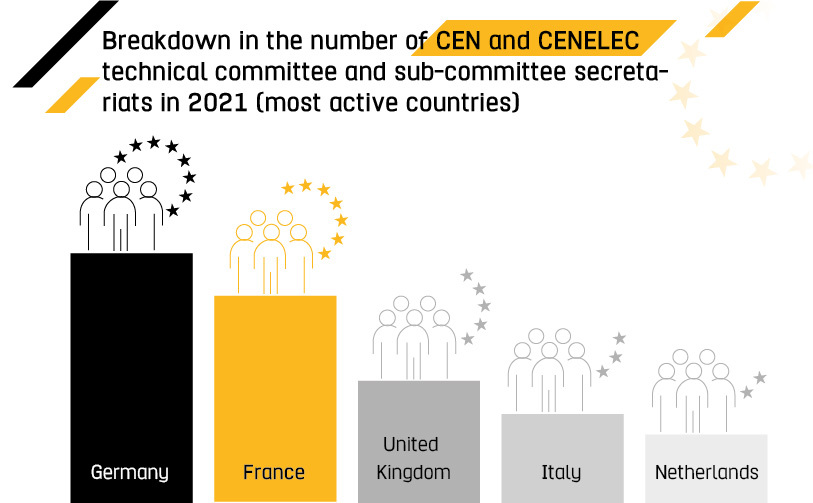Publié le 16/02/2022 PFUE: France confirmed as Europe’s second largest power in the standardization sector

Source: AFNOR 2021 international standardization survey
As is the case every year, AFNOR reviews the European and international standardization committees under France’s leadership. In 2021, France reached 2nd place on the podium behind Germany with some key victories.
Where does France rank among the 34 countries represented at CEN-CENELEC through their national standardization body? The answer is “way out in front”. The 2021 survey carried out by AFNOR has revealed that France has secured second place behind Germany when it comes to the number of committees for which it has been entrusted with secretariat duties. This means that France can make its voice heard on several topics across Europe where economic players are preparing voluntary standards with the aim of sharing best practices, promoting common methodologies and encouraging interoperable technologies.
If we turn back the clock, it can be seen that France’s influence has been gaining traction, with 97 committees and sub-committees held in Europe compared to 83 in 2015 and 70 in 2006. France has achieved leadership status in topics covering management and services and, alongside Germany, in consumer goods, sport and leisure, and everyday subjects. In 2021, France took over secretariat duties from the Netherlands for the technical committee on postal services (CEN/TC 331) and put forward proposals to create a new structure on animal health diagnostic analyses (CEN/TC 469). In 2020, France was awarded responsibility for the committee on the management and preservation of digital content (CEN/TC 468) and on energy measurement plans (CEN/CLC/JTC 15).
France leads the way on gender equality
On a global scale, France ranks third behind Germany and the United States, and just ahead of Japan, the United Kingdom and China, which continues to gain ground every year. This ranking can be attributed to the number of secretariats held within ISO (the International Organization for Standardization) and IEC (the ISO for electrotechnologies). France scored a major global victory in 2021 when it was given the go-ahead to lead plans for a new voluntary standard on equality between women and men. In 2020, France was granted responsibility for committees on surfaces with biocidal and antimicrobial properties (ISO/TC 330) and on biodiversity (ISO/TC 331). France will not be starting from scratch when it comes to gender equality, since it published a document of good practices during the summer of 2021. Since then, the subject has been propelled to the top of the agenda for the French Presidency of the European Union. Interested? AFNOR is organizing a free webinar called “PFUE” on 25 February 2022.
France’s second place on the podium is worth highlighting during this first half of 2022 as the country takes over presidency of the Council of the European Union, and this achievement comes a day after the presentation of the European standardization strategy by Thierry Breton, the European Commissioner for the Internal Market. The strategy was outlined on 2 February 2022 and confirms the key role played by voluntary standards in the economic leadership that Europe claims to have or is aiming to attain in various areas, including the recycling of raw materials, semiconductors, and non-financial reporting. “European standardization was built in response to the development of the European project. It comes as no surprise that France and Germany are the frontrunners in terms of the countries with the greatest involvement in the work pursued by CEN and CENELEC. Between them, France and Germany manage more than half of the technical structures in those committees,” explains Camille Cloitre from AFNOR’s International Affairs Department.

